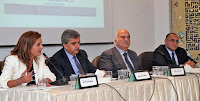 Social media are a double-edged sword that is equally capable of enhancing social cohesion and inciting hatred that tears apart the social fabric, experts in Amman, Jordan, said on Tuesday.
During a discussion on the impact of social media on social solidarity held at the Arab Thought Forum, experts highlighted the need to promote ethical responsibility among users and to direct their efforts towards positive uses.
Social media are a double-edged sword that is equally capable of enhancing social cohesion and inciting hatred that tears apart the social fabric, experts in Amman, Jordan, said on Tuesday.
During a discussion on the impact of social media on social solidarity held at the Arab Thought Forum, experts highlighted the need to promote ethical responsibility among users and to direct their efforts towards positive uses.
HRH Prince Hassan, the president of the forum, highlighted the need to employ technology and information resources to improve society, citing social media tools as a form of technology that should strive to enhance social cohesion.
Meanwhile, he called for the development of a new platform that addresses the future of Jordan and commits to principles of moderation and reason.
Acknowledging the potential of youths to build a better future, Prince Hassan said the platform should guide the wide use of social media tools to improve social cohesion and achieve societal advances that would allow the region to bridge the gap with developed countries.
Meanwhile, the forum’s secretary general, Mohammad Abu Hammour, cited a number of studies that showed a remarkable increase in the use of social media networks in Jordan and the region in recent years.
“There are some 6 million Internet users in Jordan, including 5.2 million social media users,” he said, noting that they belong to several age groups, educational levels and income brackets.
Social media outlets have changed the power dynamics of communication tools, said Basim Tweissi, dean of the Jordan Media Institute, adding that the new tools have spread knowledge and information horizontally to a larger segment of society.
Acknowledging that the value of users’ activities on these networks depends on how they use them, he cited the ice bucket challenge, a charity campaign which went viral on social media channels and raised millions of dollars, as an example of a positive use of social media.
“In our region, social media tools have contributed to the increase of hate speech and the undermining of others over the past few years,” Tweissi noted, citing a “heavy” presence of politics online.
He pointed out a phenomenon in which activists and members of minority groups with large numbers of followers seek to polarise public opinion towards their views, in light of an absent majority.
Tweissi suggested introducing media literacy courses to school and university curricula in order to better equip the younger generation to deal with these platforms, teaching students how to differentiate between opinions and facts.
Author and journalist Barihan Qumuq said social media outlets offer venues for self-expression among marginalised segments of society, as well as elites and youths, with the most positive impact among the latter.
Observations of users’ posts and comments on social media platforms show a growing anger and feelings of hate and disrespect, in addition to the use of confrontational speech, the journalist said.
Such incidents not only demonstrate a misunderstanding of freedom of expression, but also show misconceptions of major concepts and ideas that stir these hateful dialogues, such as secularism, liberalism, peace and corruption, Qumuq added.
Furthermore, the author warned that social media could threaten societal security, pointing to the increase in violations of privacy and acts of violence, adding that many users have developed a kind of “addiction” to these platforms.
Yet, several grassroots humanitarian and philanthropic initiatives were able to succeed by gathering concerned people in the virtual world and moving them to the real one, she noted.
By Dana Al Emam












0 Comments